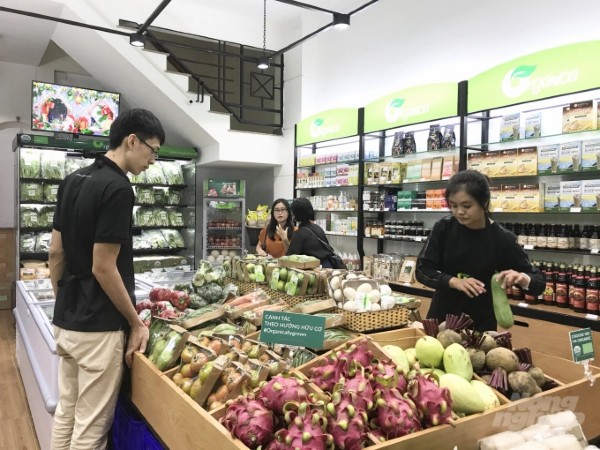November 28, 2025 | 02:49 GMT +7
November 28, 2025 | 02:49 GMT +7
Hotline: 0913.378.918
November 28, 2025 | 02:49 GMT +7
Hotline: 0913.378.918

An organic product store in HCMC. Photo: Son Trang.
Mr. Nguyen Quoc Toan, Director of the Agricultural Products Processing and Development Department, said that by the end of 2019, the area of organic cultivation had reached about 237 thousand hectares, a sharp increase compared to 53 thousand hectares a year in 2016.
Currently, 46/63 provinces are implementing organic production. 17,168 farmers and 97 businesses are organizing organic production; 60 enterprises are exporting organic products with a turnover of about 335 million USD/year.
Vietnamese organic agricultural products are consumed domestically and exported to 180 countries, including the US, EU, China, Japan, Germany, UK, Korea, Russia, Singapore, France, Belgium, the Netherlands, Italy..., the largest markets for organic agricultural products.
According to Mr. Ha Phuc Mich, Chairman of the Vietnam Organic Agriculture Association, organic agriculture is growing rapidly, especially since the issuance of Decree 109/2018 of the Government on organic agriculture. Organic production is getting more and more attention from local authorities, businesses and farmers...
The development of organic agriculture has been put in the agenda for economic development in many provinces. It shows a progress in the awareness of all levels of committees and local authorities about organic agriculture.
However, the development of organic agriculture in recent years has also been posing many problems in management, certification, inspection and supervision...
Deputy Minister of Agriculture and Rural Development Tran Thanh Nam said that it is very important to manage organic production so as to ensure that products labeled organic are actually products of organic agriculture. It is also necessary to promote the training of management staff, inspection and supervision of organic agricultural products from ministerial to local level. There should be training courses for businesses, producers and traders of organic products.
Deputy Minister Tran Thanh Nam emphasized that organic production is just one of the methods of agricultural production. It can not replace other methods of production in ensuring food security. Therefore, the development of organic agriculture in localities should be carefully planned.
Localities need to determine which areas are for organic production and which areas still maintain non-organic production methods. It is also necessary to determine which products will be organic, and which products will remain traditionally produced.
The organic agriculture development project for the period 2020-2030 that has just been approved by the Government is derived from the practice, general method and direction of the Scheme on agricultural restructuring towards increasing added value and sustainable development, implementing national target programs and bringing into play the strong potentials of organic agriculture in regions and localities, contributing to positioning and enhancing the brand of Vietnamese agricultural products on the world agriculture map, bringing Vietnam into a country with an organic agricultural production level equal to that of advanced countries in the world.
Author: Sơn Trang. Translated by Meagan Phan, Edited by Duc Huy.

(VAN) According to Mr. Vo Minh Thanh, Director of the Tay Ninh Department of Agriculture and Environment, Resolution 57 has created a new development pathway for the locality, shifting from traditional toward modern agriculture.
/2025/11/26/4909-2-154329_878.jpg)
(VAN) Pearl grouper farming in HDPE cages not only delivers economic efficiency but also contributes to protecting the environment, creating jobs, and promoting marine-based experiential tourism.

(VAN) The model of making a living under the forest canopy through the agroforestry system in Van Son commune, Bac Ninh province, is expected to generate an annual income of approximately VND 30 million/ha.

(VAN) Many enterprises in Can Tho are harnessing natural energy and reducing greenhouse gas emissions in their production processes, thereby contributing to the promotion of a sustainable green transition.
/2025/11/24/3536-2-112800_176.jpg)
(VAN) Dong Nai now has tens of thousands of hectares of forests certified for sustainable management, and this area will continue to be expanded in the coming period.

(VAN) Vinh Ha hamlet (Dai Xuyen commune, Hanoi) is shifting away from small-scale farming as households adopt bioscurity into their breeder chicken models.

(VAN) Heavy rains make aquatic species more vulnerable to disease. Proactive water management and high-tech systems help farmers prevent outbreaks and protect yields.